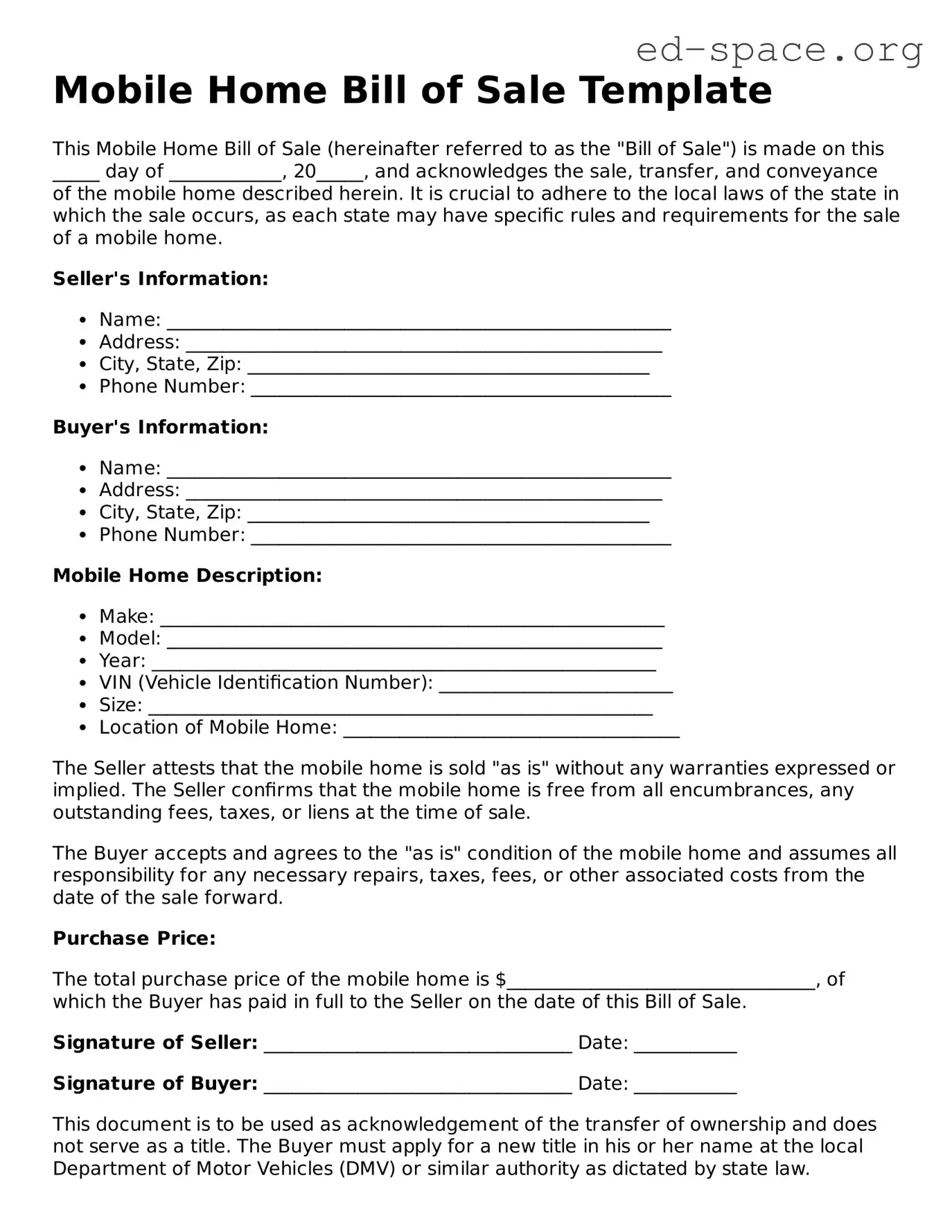What is a Mobile Home Bill of Sale form?
A Mobile Home Bill of Sale form is a crucial legal document used in the process of buying or selling a mobile home. It serves as a record of the transaction, detailing the agreement between the buyer and the seller. This document usually includes information such as the names and addresses of the parties involved, a description of the mobile home, the sale price, and the date of sale. Its primary purpose is to provide proof of ownership transfer from the seller to the buyer and to outline the specific terms and conditions of the sale.
Why is a Mobile Home Bill of Sale form necessary?
Having a Mobile Home Bill of Sale form is essential for several reasons. Firstly, it legally documents the transaction, providing evidence that the sale occurred and the ownership of the mobile home has changed hands. This documentation can be critical for tax purposes, resolving disputes, and clarifying the terms of the sale. Additionally, it protects both the buyer and the seller by detailing the agreed-upon conditions, thereby minimizing misunderstandings or potential legal issues in the future. Lastly, various states require a completed bill of sale for the registration of the mobile home under the new owner’s name.
What details are typically included in a Mobile Home Bill of Sale form?
Typically, a Mobile Home Bill of Sale form will include certain key pieces of information to ensure the sale is well-documented. These details often encompass the names and addresses of both the buyer and the seller, the make, model, year, and serial number of the mobile home, the sale price, payment terms (if any), the sale date, and signatures of both parties. Additional information may also be required depending on the jurisdiction, such as the location of the mobile home, any warranties or disclosures, and acknowledgment of the receipt of funds.
How does one obtain a Mobile Home Bill of Sale form?
Obtaining a Mobile Home Bill of Sale form can be done in several ways. One common method is downloading a template from a reliable legal documents website. These templates are designed to meet general requirements and can be customized to fit the specifics of your transaction. Alternatively, legal assistance providers or attorneys specializing in real estate or personal property law might offer customized forms that are specifically tailored to the legal standards of your state or locality. It’s crucial to ensure that the form complies with local regulations to be considered valid.
Is notarization required for a Mobile Home Bill of Sale form?
Whether notarization of a Mobile Home Bill of Sale form is required can vary by state. Some states mandate notarization as part of the process to formally recognize the document’s validity, making it a legal requirement for the transfer of ownership. In jurisdictions where notarization is not obligatory, having the bill of sale notarized can still be beneficial. It adds an extra layer of authenticity and can help prevent potential legal complications by verifying the identities of the parties involved in the transaction. Consulting with a legal professional can provide guidance specific to your situation.
Can a Mobile Home Bill of Sale form be used for both new and used mobile homes?
Yes, a Mobile Home Bill of Sale form is applicable to transactions involving both new and used mobile homes. Whether the mobile home is brand new from the manufacturer or previously owned, this document is necessary to record the sale and transfer ownership. The key is ensuring that the form accurately reflects the condition and details of the mobile home at the time of sale, including any warranties or disclosures relevant to its new or used status.
What happens if a Mobile Home Bill of Sale form is not used in a transaction?
Not using a Mobile Home Bill of Sale form in a transaction can lead to several potential issues. Without this document, there may be no formal record of the sale, making it difficult to prove ownership or resolve disputes regarding the terms of the sale. This lack of documentation can also complicate the process of registering the mobile home under the new owner’s name or obtaining insurance. Moreover, it may expose both parties to the risk of future legal challenges, as there would be no written agreement delineating the rights and responsibilities of each party.
Are there any specific instructions for completing a Mobile Home Bill of Sale form?
When completing a Mobile Home Bill of Sale form, it is crucial to ensure that all information is accurate and thorough. Both parties should verify the details of the mobile home, such as the make, model, year, and serial number, and ensure that their personal information is correctly listed. The sale price and terms should be clearly stated, and any additional agreements or disclosures should be included. Both the buyer and the seller must sign the document, and it’s advisable to keep copies for both parties’ records. If required, notarization should be completed to validate the form. For specific legal requirements, it may be beneficial to consult with a legal professional.
After the sale is complete, what should be done with the Mobile Home Bill of Sale form?
After completing the sale, the Mobile Home Bill of Sale form should be kept in a safe place by both the buyer and the seller as a record of the transaction. The buyer may need to present this document for various purposes, such as registering the mobile home in their name, obtaining insurance, or proving ownership. The seller should also retain a copy to document the transfer of ownership and for personal records. Additionally, it's advisable to check if the state or local government requires a copy of the bill of sale for their records or for registration purposes.
